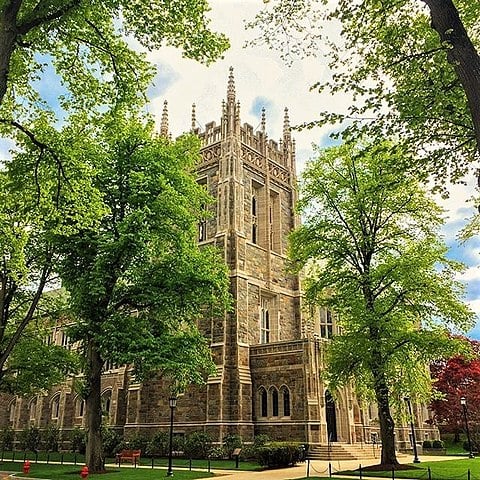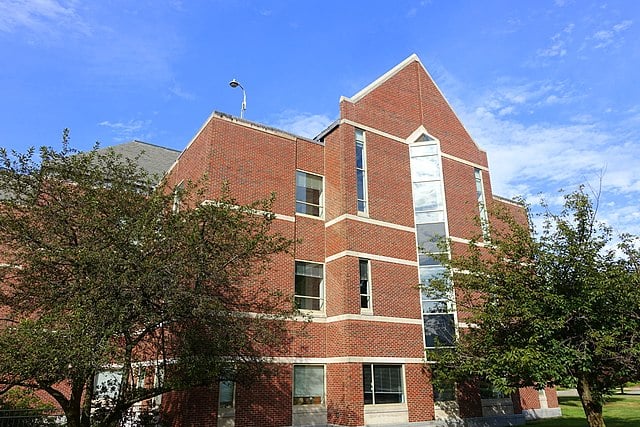Founded in 1863, Boston College is a private Catholic research university located in Chestnut Hill, Massachusetts. BC is the oldest institution of higher education in the city of Boston.
Since the college was established, it has maintained its commitment to the Jesuit ideals of its founders, declaring a dedication to public service, the liberal arts, scientific inquiry, and international collaboration.
According to the most recent data, the school’s total enrollment is 14,890 students, 8% of which are international students.
The student-to-faculty ratio for Boston College is 11:1, with an overwhelming 94% of the school’s 882 full-time faculty members holding doctoral degrees.
BC’s motto is “ever to excel,” a quote from the ancient Greek epic poem The Iliad, and is meant to emphasize the school’s mission to foster innovation and critical thinking skills that are capable of addressing the world’s most pressing current issues.
Notable BC alumni include television producer and actress Amy Poehler, CEO and president of CVS Health Karen Lynch, and many other distinguished public figures.
Boston College is home to 31 different sports teams that compete in the NCAA’s Division I athletic conference and several intramurals and club sports. The school’s athletes are known as the eagles, and their colors are maroon and gold.
For students who are not happy at their current undergraduate institution, transferring to Boston College could significantly improve their college experience.
Read on to learn important information for students interested in transferring to BC, including acceptance rates, application requirements, and more.
Boston College Transfer Acceptance Rate

According to some sources, the acceptance rate for transfer applicants at Boston College is 54%, more than twice the 26% average acceptance rate for first-year students.
However, it should be noted that this rate can vary significantly from year to year, depending on the number of applications the school receives. Furthermore, transfer students make up only about 1% of the student body.
Each year, Boston College admits around 125 transfer students. Most of these students start school in the fall semester, while about 40 are admitted to begin classes in the spring semester.
For the Boston College first-year class of 2025, the acceptance rate was just 19%, suggesting that admission to the school may be becoming more competitive over time.
It is difficult to say whether or not this predicted trend will apply to transfer students.
Still, it can be said that the likelihood of being admitted to Boston College is greater for transfer students than it is for first-year students.
Application Requirements & GPA for Boston College Transfers
In order to be eligible to transfer to Boston College, students must have completed a minimum of nine credits of college-level coursework prior to the admission deadline for the semester they wish to start at the school.
There is no required minimum GPA for transfer students at BC.
However, it may be helpful to know that the college’s average high school GPA of accepted first-year students is 3.96.
This means that most of the admitted applicants have earned mainly As with only a few Bs, most likely including multiple AP or IB classes.
Furthermore, Boston College will only accept transfer credits for courses in which the student earned a C- or higher.
Students should first fill out the Common Application online to begin the transfer application process. In addition to the application, students will need to submit a short personal statement of no more than 650 words.
Along with an official high school transcript or certificate of GED, BC requires that transfer applicants submit a list of all courses taken and grades earned in all classes at their previous college or university.
Required supplemental materials include a letter of recommendation from a past teacher or professor and an academic and disciplinary report from the Dean of Students at each previously attended institution.
There will be an $80 application fee due when applying. Fee waivers are available for those for whom the fee poses financial hardship.
Boston College Transfer Deadline

For those applying to transfer to Boston College in the fall semester, the application deadline is March 15 of each year. For spring semester transfer applicants, the deadline is November 1.
Neither mid-year freshman nor nursing students are eligible for spring admission.
In order for their applications to be considered, students must submit the Common Application, the personal statement essay, and all supporting materials before the deadline.
Although Boston College has adopted a test-optional policy for transfer student applications for spring 2022 and fall 2022 admissions cycles, students who would like to submit their SAT or ACT scores for consideration may do so before the deadline as well.
Standardized test scores must be sent directly to BC by the testing agency for those students who do wish to opt to submit them.
What is the Decision Date for Boston College Transfers?
Those who apply to Boston College as transfer students for the fall semester will be notified of their admissions decisions by email no later than May 20 of each year.
For spring semester transfer applicants, admissions decisions will be sent out by December 15 at the latest.
In the period of time between when the application is submitted and when admissions decisions are to be released, you can get a head start on applying for financial aid.
It should be noted that at Boston College, financial aid is awarded on the basis of need rather than merit.
All applicants who are either United States citizens or permanent residents are eligible to receive need-based financial aid. The amount awarded will be determined according to the particular circumstances of each student’s demonstrated institutional need.
Deciding Whether You Should Transfer to Boston College

Whether or not you should transfer to Boston College is not something that can easily be answered with a yes or no.
There are a plethora of things to consider, including your academic needs and interests, what the school has to offer, and what makes the school different from your current college.
Still, there are several reasons to consider choosing Boston College for the remainder of your undergraduate experience. For one, BC is affordable.
According to Kiplinger’s annual list, Boston College has been ranked #18 among all universities in the country for best college values.
For the 2020 to 2021 academic year, BC spent over $160 million giving out need-based scholarships and grants to students.
Aside from the financial appeal, the school also offers great career outcomes. 93% of BC’s graduating class of 2020 was employed or pursued further education within ten months.
An impressive 79% of these graduates received job offers during their senior year at BC. An additional 13% received job offers in the summer after graduating.
As these statistics show, Boston College has a strong record for setting students up well for entering the job market following graduation.
Another common way to evaluate student satisfaction at a college is to look at the school’s first-year student retention rate.
At Boston College, the retention rate is 95%, showing that most BC students are happy at the school, electing to stay after their first year of study.
RECAP: How to Apply As a Transfer Student to BC
The first step to applying to Boston College as a transfer student is to ensure that you are eligible.
Students must have taken at least nine credits of college-level coursework prior to the application deadline for the semester they intend to enroll at the school.
Then, see when the application will be due for you.
If you are interested in enrolling in courses at BC in the fall semester, the application deadline is March 15. For those who would like to begin during the spring semester, the deadline is November 1.
Next, fill out the Common Application online. The application will ask for an intended major and a second choice, so be prepared to make a selection.
Once the application information has been completed, write your personal statement.
Be sure to proofread it thoroughly so that it is free of all grammar and spelling errors, and check to be certain that it is under the 650-word maximum.
Then, collect your required supporting documents.
These include a letter of recommendation from a past teacher or professor, official transcripts from high school and from all previously attended undergraduate institutions, and an academic and disciplinary report from the Dean of Students at each other college or university attended in the past.
Before you are finished with your application, you will need to either pay the $80 application fee or submit your fee waiver request.
Last, consider if there are any other supplemental materials you would like to include with your application, such as standardized test scores.
You should only opt to submit optional documents if you feel as though they will strengthen the application by sowing some aspect of your academic ability that is not captured by the rest of the application already.














